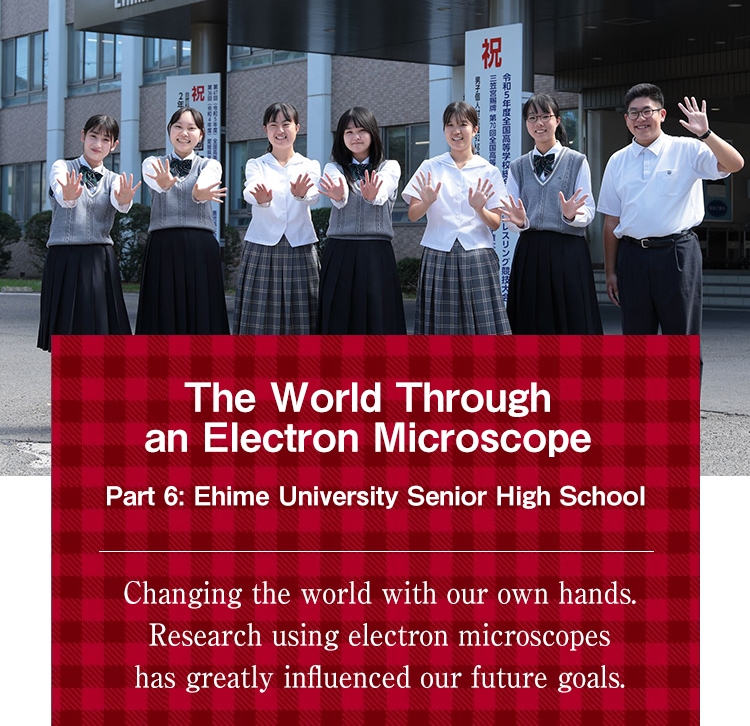
Ehime University Senior High School was founded in 1900 as Ehime Agricultural School. Later, in 1956, it became the Ehime University Faculty of Agriculture Agricultural High School. In 2008, it was reorganized into a general curriculum school affiliated with all faculties of Ehime University and was renamed "Ehime University Senior High School." It is the only national high school on the island of Shikoku to receive the SGH (Super Global High School) and WWL (World Wide Learning) designations. The school is passionate about education in the field of science and offers collaborative classes with the university during summer vacation, including Basic Science Experiments for first-year students and Applied Science Research for second-year students.
Furthermore, many students choose a theme on which they can receive guidance from university faculty members of science departments in their second-year required course Project Study I. In their third-year, approximately 40% of students take the elective course Product Study II, with science students accounting for about half of these students.
The Science Department was established in 2009 and currently has 27 members divided into five research groups. Here we will introduce the eight-student research group known as "Plastic Girls." This group, which began their research activities in 2020 and has received many awards in competitions for their research on plastics that affect the environment, is also engaged in awareness raising activities.
(All participants from the group)
Kazunori Nakagawa (teacher), Ms. Kondo (3rd year), Ms. Murakami (3rd year), Mr. Hiroe (2nd year), Ms. Kadota (2nd year), Ms. Kurano (2nd year), Ms. Takenouchi (1st year), Ms. Morikawa (1st year), Mr. Kakiuchi (1st year)
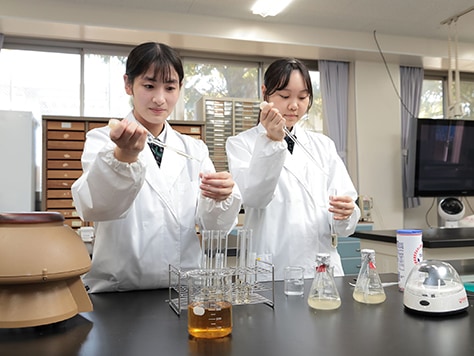
tudents at work developing of marine biodegradable plastics. Time passes quickly each day.
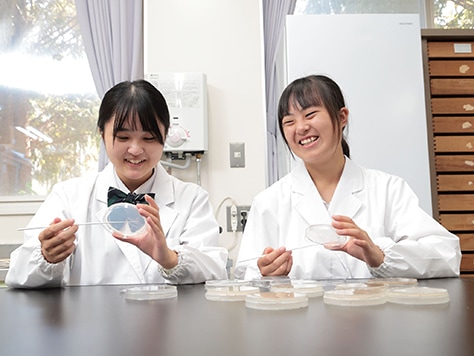
Students observing plastic-eating mealworms. Everyone looks so happy.
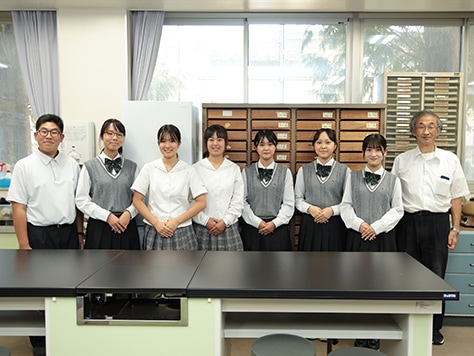
Mr. Nakagawa, a comrade to his students, and the Plastic Girls.
Kakiuchi, the lone boy in the group, fits in naturally.
Nakagawa:Plastic Girls is currently conducting research on four themes: "Marine Microplastics Research," "Development of Marine Biodegradable Plastics," "Research for Plastic-Degrading Bacteria from the Gut Bacteria of Plastic-eating Mealworms," and "Marine Bacterial Microbial Rhodopsin Research." When teaching, I always work to make researching fun while keeping a goal in mind. When giving presentations, I tell my students to remember that "research doesn’t matter if is not communicated properly," and that it is important to try to explain even specialized research in a way that laypersons can understand. Above all, I believe that if the instructor does not enjoy the activity, the students will not be able to enjoy it either, so I work with the students to make the research interesting. For me, the students are like my buddies doing battle together in competitions.
Murakami:ndeed, Mr. Nakagawa is more like a research colleague than a teacher (laughs). He is always open to discussions about what we could do or how we could do it better. I am very grateful that I can say anything to him without hesitation. I feel that my teacher's inspiration has helped me devote so much effort to my research.
Kondo:I was never particularly interested in science. From elementary school I had always wanted to go into medicine. One day, I was doing some left over work for my basic biology class and happened to see the science club in the same classroom. They had an electron microscope, and at first, I thought, "What is that strange square box?" Everyone looked so happy and engaged in their work, which drew me into their conversation. They let me see the electron microscope which opened my mind to the field of science. I guess you could say that the electron microscope has changed my future. My hope now is to do research dealing with environmental issues for many years to come.
Murakami:I also want to continue this research into the future. I am now in my third year and am preparing for entrance exams. My hope is to go to a university where I can continue this research. Although it may be difficult for me to get into my desired university, the other day I sent a message to the university saying that even if I fail their exam, I would be happy to do research with them.
Kadota:I have always been interested in science, but the reason I joined Plastic Girls was because I saw how much Murakami and Kondo enjoyed their work. Seeing them made me become interested in their research topics.
Kurano:I was also drawn in by the fun way in which those two were doing research.
Morikawa: :I want to do medical-related work in the future. I am very interested in biology, and I believe that if we can solve the problems created by plastics, it will help not only fish and other marine life but also human life. I joined Plastic Girls because being able to help lives through my research would make me proud.
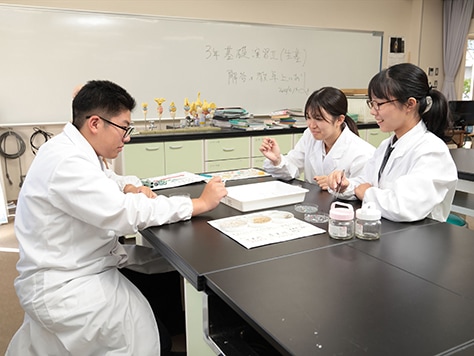
Research on marine microplastics collected from the ocean. First-year students are often the first to be in charge of this task.
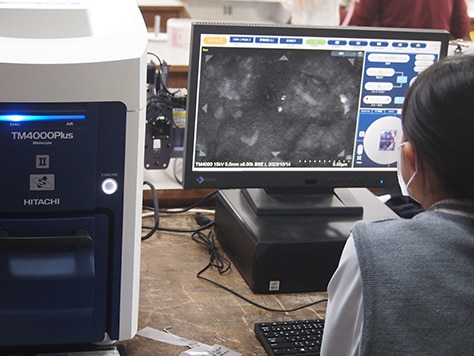
The electron microscope fully utilized in research.
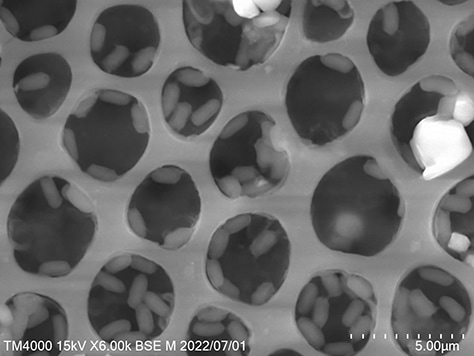
Electron microscope images(PHB and plastic-degrading bacteria)
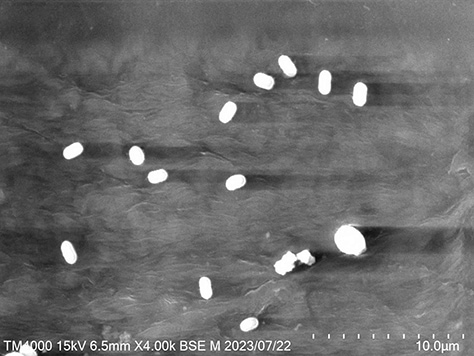
Electron microscope images(marine bacteria)
Murakami:Electron microscopes are used in so many aspects of research. In our research of marine plastic, electron microscopes have been very useful for observing the surface of microplastics taken from the ocean, as well as for seeing the effects (microplastic adhesion) on marine products grown in the ocean, such as seaweed.
Kondo:In our development of marine biodegradable plastics, we regularly used electron microscopes to observe whether the PHB plastic we made was really degraded by marine bacteria. Through this, we were able to document the degradation in a clear and convincing way to prove the fact that it was indeed being degraded.
These observations also enabled us to show that plastic shopping bags containing biomass plastics, which are said to be environmentally friendly, behave in a significantly different matter from what the public believes. Many people may think that when they throw away shopping bags, that they will just turn into earth. However, electron microscope observation has revealed the fact that very little is broken down into the soil. In fact, there are concerns that biomass plastics are physically broken down by ultraviolet light into finer nanoplastics that will eventually become airborne and become pollutants such as PM2.5. Of course, the fact that petroleum is not used is one advantage.
Murakami:Observing degradation on the surface of plastics forms the basis of our search for degradative enzyme-secreting bacteria, and it is here in which the electron microscope is very useful. We cultivate bacteria that appear to be plastic-degrading bacteria in a liquid medium, immerse the plastic in this medium, and record any changes on the surface. Actually, the other day, we succeeded in taking photographs of bacteria that appear to be plastic-degrading bacteria.
Nakagawa:Our research on microbial rhodopsin in marine bacteria looks into the awesome potential of microbial rhodopsin, which was discovered during the process of culturing marine bacteria. Microbial rhodopsin is a type of protein, which we believe may help solve environmental problems. We are researching the possibility that this material, which can convert a small amount of light into energy for life, may lead to a technology that can utilize energy from weak light without the need for strong light like solar cells.
Kadota:This research requires an understanding of the mechanism of pigmentation changes in microbial rhodopsin. For this reason, it is very important to observe the bacterial cell changes of different colors using an electron microscope.
Murakami:Our research is aimed at determining the true nature of plastics that flow out into the ocean, as well as searching for bacteria that break down plastics and creating plastics that break down naturally. The most important thing for us in this research is to see with our own eyes through an electron microscope how plastics and bacteria change and to record these changes. The electron microscope is really important for making our research convincing.
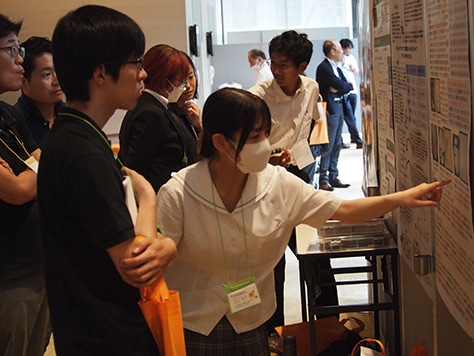
Presentation at the Hyper Interdisciplinary Conference (Osaka), August 2023.
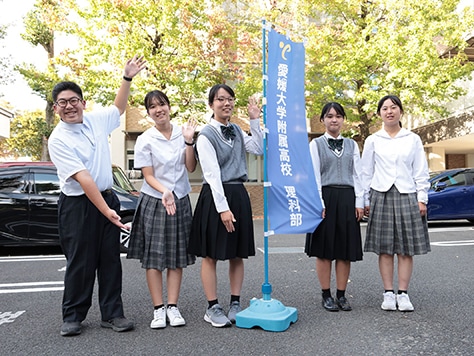
Students surrounding the department's flag which is brought to contests, etc.
Murakami:Through our research, we feel that science can change the world. On the issue of plastics, we are not thinking about how to stop the use of plastics, but because of how essential plastics are to people’s lives, we are instead using the power of science to search for a way in which humans and plastics can coexist. I have come to believe that if no one else will do it, I will do it. Unfortunately, there is not enough time left for me to do so in high school, so I hope to continue my research for many years to come.
Kondo:We do research every day after class, and even on weekends, and I really enjoy every day of it. Before I used to think only of going home, but I have completely changed. Now, I really wish I had an electron microscope in my own house.

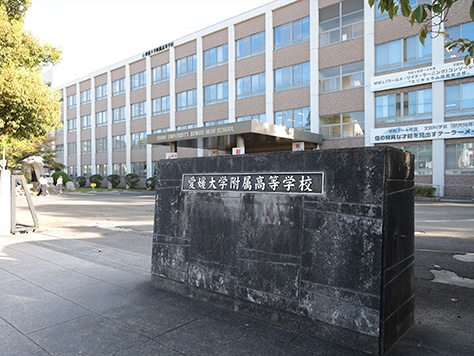
The Science Department was established in 2009, a year after reorganizing into a general curriculum school. Currently, there are 27 members divided into five research groups. Plastic Girls has received a wide variety of awards including the following:
2021 Awards
- "Wings of Dreams" Global Scientist Award, MEXT Prize
- Treasures of the Sea Academic Contest, Second Prize
- United Nations University Institute for Advanced Studies on Sustainability, Youth Environmental Activity Presentation Contest, Director's Award
2022 Awards
- AEON Eco-1 Grand Prix, Prime Minister's Prize
- REHSE High School Student Independent Research Activity Support Program, Grand Prize
- Marine Challenge Program, Second Prize
2023 Awards
- High School Environmental Chemistry Award, Grand Prize
- National High School Comprehensive Culture Festival, Natural Science Division, Encouragement Prize (Top 8) They have also made presentations to the world at an international symposium of the Ministry of the Environment in May 2022 and at an international conference of the United Nations University in July of the same year.
We interviewed members of Plastic Girls, a research group that has won numerous awards for its work on solving microplastics problems using marine bacteria, and the teacher who supervises them about their daily challenges.